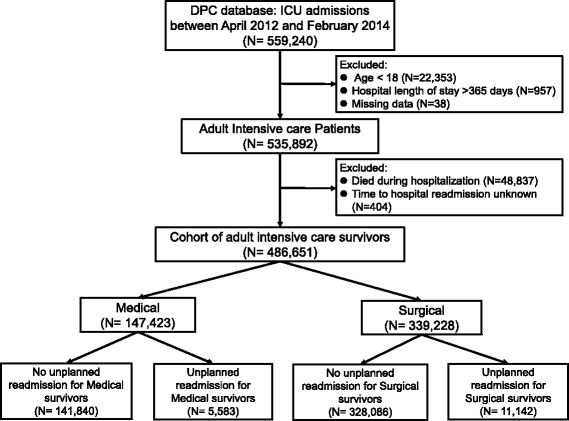Predictors associated with unplanned hospital readmission of medical and surgical intensive care unit survivors within 30 days of discharge
- PMID: 29507728
- PMCID: PMC5831844
- DOI: 10.1186/s40560-018-0284-x
Predictors associated with unplanned hospital readmission of medical and surgical intensive care unit survivors within 30 days of discharge
Abstract
Background: Reducing the 30-day unplanned hospital readmission rate is a goal for physicians and policymakers in order to improve quality of care. However, data on the readmission rate of critically ill patients in Japan and knowledge of the predictors associated with readmission are lacking. We investigated predictors associated with 30-day rehospitalization for medical and surgical adult patients separately.
Methods: Patient data from 502 acute care hospitals with intensive care unit (ICU) facilities in Japan were retrospectively extracted from the Japanese Diagnosis Procedure Combination (DPC) database between April 2012 and February 2014. Factors associated with unplanned hospital readmission within 30 days of hospital discharge among medical and surgical ICU survivors were identified using multivariable logistic regression analysis.
Results: Of 486,651 ICU survivors, we identified 5583 unplanned hospital readmissions within 30 days of discharge following 147,423 medical hospitalizations (3.8% readmitted) and 11,142 unplanned readmissions after 339,228 surgical hospitalizations (3.3% readmitted). The majority of unplanned hospital readmissions, 60.9% of medical and 63.1% of surgical case readmissions, occurred within 15 days of discharge. For both medical and surgical patients, the Charlson comorbidity index score; category of primary diagnosis during the index admission (respiratory, gastrointestinal, and metabolic and renal); hospital length of stay; discharge to skilled nursing facilities; and having received a packed red blood cell transfusion, low-dose steroids, or renal replacement therapy were significantly associated with higher unplanned hospital readmission rates.
Conclusions: From patient data extracted from a large Japanese national database, the 30-day unplanned hospital readmission rate after ICU stay was 3.4%. Further studies are required to improve readmission prediction models and to develop targeted interventions for high-risk patients.
Keywords: Critical illness; Hospital readmission; Intensive care unit; Outcomes research; Predictors; Rehospitalizations.
Conflict of interest statement
The Tokyo Medical and Dental University ethics committee approved this study and waived the requirement for informed consent.Not applicable.The authors declare that they have no competing interests.Springer Nature remains neutral with regard to jurisdictional claims in published maps and institutional affiliations.
Figures
References
LinkOut - more resources
Full Text Sources
Other Literature Sources
Molecular Biology Databases
Miscellaneous


